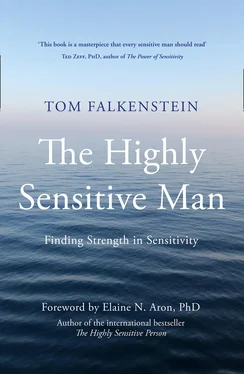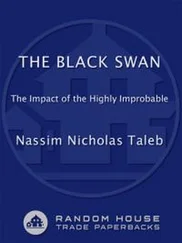What becomes clear when we take a close look at these recent studies is that all of us differ in our environmental sensitivity. And while particularly sensitive temperaments were described in earlier studies only indirectly and often negatively—with researchers believing that being more sensitive could make people more susceptible to psychological disorders—current research suggests that high levels of sensitivity are an essential and completely neutral trait. In other words, being more sensitive can be an advantage, but it can also be a disadvantage. This is completely dependent on which experiences the highly sensitive person has in the environment in which they grow up or live. The researchers whose work we have looked at in the second half of this chapter believe that natural selection led to the development of two discrete evolutionary strategies that guaranteed the survival of our species. The advantage of the reactive or sensitive strategy could be that organisms, whether human or animal, are more vigilant, sensitive, and adaptable when faced with potential opportunities and threats in their environments and social groups. Consequently, they are better able to adapt their future behavior to these new situations.
So the next time that you as a highly sensitive man find yourself in a full, loud, and sticky train car and feel unwell or tense while your traveling companion appears to be calm, can concentrate on the newspaper despite the noise, and is even able to order a hot coffee, just remember that your sensitivity is not just a disadvantage, even if it feels so in moments like this. Because it’s likely that you’re reacting more strongly not only to the negative aspects of this situation but also to the positive: the golden field of flowers that the train is speeding past, the colors of the sunset, the trees and the shrubs, some good news in your friend’s newspaper, or a funny or loving interaction in the family sitting opposite you.
Elaine Aron’s Concept of High Sensitivity
One of the researchers investigating sensitivity during the 1990s was Elaine Aron, and she was the first to observe and identify the phenomenon of high sensitivity. Aron sees high sensitivity—or sensory processing sensitivity , to use the scientific term—as a neutral, innate temperamental trait. Highly sensitive people observe things in great detail exhaustively, think longer and more deeply before they take action, and generally react more emotionally to positive as well as negative occurrences in their surroundings. This can be observed externally as a pattern of behavior in which people are more hesitant, “slow to warm up,” or “behaviorally inhibited.” But Aron believes that the underlying cause of this observable behavior is that highly sensitive people process stimuli more deeply. Using the questionnaire that she developed during her research—the Highly Sensitive Person Scale—Aron was able to show that highly sensitive people react more strongly to both positive and negative images, that they register small visual details more quickly, and even that they benefit more strongly from therapeutic interventions than non–highly sensitive people. 17, 18Using brain imaging technology, Aron was able to show over the course of numerous studies that there were differences in the brain activity of highly sensitive and non–highly sensitive people. In highly sensitive adults, the areas of the brain connected with information processing, consciousness, empathy, and activity planning, such as the insular cortex and the inferior frontal gyrus, are all more active than in individuals who are not highly sensitive. The psychologist Bianca Acevedo summarizes the results of these studies as follows:
Collectively, the present results support the notion that sensory processing sensitivity is a trait associated with enhanced awareness and responsiveness to others’ moods, as it engages brain systems involved in sensory information processing and integration, action planning, and overall awareness. These findings highlight how the highly sensitive brain mediates greater attunement and action planning needed to respond to the environment, particularly in relevant social contexts. 19
Aron’s early research from the 1990s shows that around 15 to 20 percent of all people are highly sensitive, although Pluess suggests that the most recent research, in which Aron was also involved, estimates this figure to be around 30 percent. Pluess has also shown that there are three, rather than two distinct sensitivity groups, as previously thought, on a sensitivity continuum: a high sensitive group (31%), a medium sensitive group (40%) and a low sensitive group (29%). So not just “orchids” and “dandelions,” but also “tulips.” 20
Aron differentiates high sensitivity from introversion and has been able to show that around 30 percent of all highly sensitive people are, in fact, extroverted. 21This means, of course, that around 70 percent of all highly sensitive people are indeed introverted. Aron believes that high sensitivity can exist alongside a range of other apparently contradictory temperamental and personality traits, such as “sensation seeking.” 22The term sensation seeking was coined by the clinical psychologist Marvin Zuckermann, who has been researching this characteristic since the 1960s. He uses the term sensation seeking to describe people who seek out variety and new experiences, and, according to Zuckermann, it is a trait that is inheritable in 60 percent of cases. 23, 24This characteristic tends to be connected to behaviors that can be described as “adventure-, risk- and excitement-seeking.” Sensation seekers are more quickly bored than other people and thus seek out variety and potentially risky activities more often than other people. They tend to be restless when they find themselves in situations that offer little stimulation or variety. Zuckermann suggests that more men than women are sensation seekers and that those behaviors that accompany this trait tend to be moderated by age. Having a tendency to seek out risk, variety, and excitement, while also being highly sensitive, is something that Aron often compares to having “one foot on the brake, the other on the gas.” 25
Aron also differentiates between high sensitivity and neuroticism—the tendency to react anxiously or depressively. Aron believes that highly sensitive people only have a higher risk of developing anxiety, depression, or shyness in life if they had a childhood that involved significantly negative experiences and an environment that badly clashed with their temperaments. The particular malleability of highly sensitive children again plays a decisive role here, specifically the question of how well the attributes, expectations, behaviors, and challenges of a child’s social environment fit their temperament—what in psychology we often call “goodness of fit.” If the fit is good, or good enough, then, according to Aron, highly sensitive children will develop just as well, if not better, than children who are not highly sensitive, which tallies with the research of Boyce, Ellis, Belsky, and Pluess. It is, of course, completely possible that a highly sensitive adult will experience a depressive episode or other psychological problems in life, despite experiencing a safe and loving childhood, but what we can say is that high sensitivity in itself does not automatically lead to an increase in the likelihood of suffering from depression or anxiety.
SUMMARY
My hope is that you now feel that you have a broad enough knowledge about the academic background of high sensitivity and that you are better able to place the concept scientifically. Since the 1990s, high sensitivity, or sensory processing sensitivity, has represented a specific and active field of research that underpins the scientific basis of what Jung was already describing in 1913 as “innate sensitivity.” Around the middle of the last century, this innate sensitivity was described using an array of different terms. High sensitivity has a biological and evolutionary explanation, can be demonstrated in measurable differences in brain activity, and has recently been connected to a range of genetic variations, including in the neurotransmitters (the messengers of our nervous system) serotonin and dopamine. 26, 27For a long time, sensitivity was believed to be equivalent to introversion, despite the fact that we now know that high sensitivity and introversion are two separate things. These two phenomena do often go hand in hand, however, but we also know that around 30 percent of all highly sensitive people display extroverted behaviors in social settings. According to Aron, high sensitivity is a temperamental trait, whereas introversion and extroversion are personality styles that develop over the course of one’s life and describe our social behavior. She thus believes that we are born highly sensitive, whereas introversion and extroversion are learned.
Читать дальше












